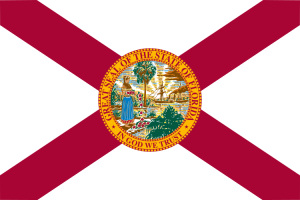
https://en.wikipedia.org/wiki/Flag_of_Florida
Questions:
1A:
The laws of intestacy under the state of Florida, states that a decedent that dies without a will, but leaves behind both a surviving spouse and issue and the issue, all of whom are also children of that spouse and that the spouse has no other issue from any previous unions, the spouse respectfully inherits the entire estate. Had the spouse have prior children, her inheritance would have been ½ of the estate. (Florida Stat.Ann. §732.102 (2) [West 2011]). In comparison to New York’s EPTL Section 4-1.1(1) where the laws differ, a decedent that dies with both the surviving spouse and issue, the spouse receives the first $50,000 and one half of the residue while the issue inherit the balance of that estate equally. New York’s law does not affect how the property is distributed based on if the spouse has prior children neither does it allow for the spouse to inherit the entire estate when there are descendants of that marriage.
1B
In the state of Florida, if a decedent dies intestate, but dies with a surviving spouse and no issue, according to Florida Stat.Ann. §732.102 (1) [West 2011]), the spouse receives the entire intestate estate. This law, which is similar to New York’s EPTL Section 4-1.1 (2) also states that the surviving spouse of the decedent inherits the entire estate.
1C
In Florida, a person who dies without a will, with no surviving spouse nor issue, the intestate estate rightfully passes to the surviving parents of the decedent, if there is no surviving parent, the estate goes to the brothers/sisters of that decedent. (Florida Stat.Ann. §732.103 (2) [West 2007]). Florida’s intestate law, which is similar to New York’s EPTL section 4-1.1 (4) also inherits the parents of the estate of the decedent if they are no spouse or issue at time of death.
2.
Testamentary capacity in the state of Florida requires that the person must 18 years old or older, or being an emancipated minor. (Florida Stat.Ann. §732.501[West 2002]). As well is in New York, EPTL Section 3-1.1 also states that a person has to be 18 or over to make a valid will.
3.
Florida’s statutes state that for a will to be duly executed, along with the other requirements, the will must be signed, acknowledged or the testator must state if they have previously signed the will in the presence of at least two attesting witnesses. (Florida Stat.Ann. §732.502 [West 2003]). Florida’s law, in similarity with New York’s EPTL section 3-1.1 also requires the will to be signed in the presence of at least two witnesses as well.
4.
The largest city in the state of Florida is Jacksonville, which consists of a population of 821,784 residents. The Law office of Katherine Schnauss Naugle, P.L (located at 810 Margaret Street, Jacksonville, FL) is a firm that specializes in probate, wills, elder law, and estate planning. My initial reaction to the site was that it was very informative and well executed as it provided brief descriptions about the area of law and also included a blog. http://www.jaxlawteam.com/
5.
My thoughts upon seeing the website for Hollis Appraisals located in 2974 Hartley Road West Jacksonville, FL was that they were quite descriptive as they showcased their appraisers and also provided potential customers with a quote if they were interested in their services. http://www.hollisappraisals.com/
6.
Unlike the state of New York, Florida does not have a separate probate court. The Circuit Court has jurisdiction over estate matters.
Name of Ct: Circuit Court Clerk
Address: 501 W Adams St, Jacksonville, Duval County, FL 32202

The new Duval County Courthouse that opened in June 2012.
7.
Florida State College at Jacksonville, located at 501 W State St, Jacksonville, FL offers an Associate in Science Degree majoring in Paralegal Studies. Their program is approved by the American Bar Association. Their tuition fee is $114.52 per credit for in-state residents which is an estimated $3,435.06 per year. As opposed to City tech’s, tuition, in which they charge $275 per credit totaling to 8,250 per academic year resulting in City tech’s tuition costing an additional $4,815 more.
Description of their Estates, Trusts and Wills Course: This course is a study of the legal aspects of the preparation of wills, trusts and advanced directives as well as the probating of estates. It also covers the procedures involved in accounting, administrations, gifts, life insurance and estate planning.

http://www.fscj.edu/academics/areas-of-study/public-safety-and-security/paralegal-studies-as









